TODAY’S READING FROM THE OLD TESTAMENT- 2 KINGS 23:31-25:30
It is ironic that on July 4th, when in the USA we celebrate our country’s birth and its cherished freedoms, we read of the God-birthed nation of Israel going into captivity in Babylon. The nation has lost its freedoms through neglecting its responsibilities to walk in the light of God’s revealed truth. The same danger is faced by our nation today.
Psalm 11:3 3 If the foundations are destroyed, What can the righteous do?”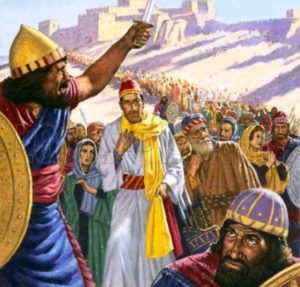
Today we come to the end of 2 Kings, and the end of the kings of Israel. No king from the Davidic line will sit on the Throne of David until the promised Son of David, Jesus of Nazareth, who is the Christ, comes to reign on earth. Prophecy is being fulfilled precisely.
Jesus came as Israel’s king in His first coming, but His rule was rejected (John 1:11).
Jesus took to Himself the title of ‘Son of David’ when He entered Jerusalem on that fateful week. He is the fulfillment of God’s unbreakable covenant promise. A remnant praised him as such in His first coming (Matt 20:30; 21:9). He was born ‘king of the Jews’ (Matthew 2:2) and He was crucified as ‘King of the Jews’ (John 19:19-22).
John 18:37 37 Therefore Pilate said to Him, “So You are a king?” Jesus answered, “You say correctly that I am a king. For this I have been born, and for this I have come into the world, to testify to the truth. Everyone who is of the truth hears My voice.”
Jesus spoke of the kingdom of God as ‘my kingdom’ (Luke 20:30; John 18:36), yet He clarified that His kingdom was not of this world. He promised that one day He will return to reign on the earth (Matthew 26:64; Mark 13:26; Acts 1:6-8,11).
When Christ returns it will be for the purpose of reigning as King of Kings and Lord of Lords. He will reign, as we learn in today’s reading from Psalm 2, “with a rod of iron” (Psalm 2:9).
In contrast to the glorious reign of Christ that is to come in the future, the reality of which is already being experienced in the hearts of regenerated believers, in the Book of Kings, we see the failure of human kings. The Book reminds us of the frailty and fickleness of our political leaders, and more importantly, the frailty and fickleness of our own hearts. We need a Savior as well as a King!
We start with the reign of Jehoahaz. He reigned for only three months before he was taken away in chains to be imprisoned in Riblah in the land of Hamath by Egypt’s Pharaoh, King Neco. He dies a prisoner in Egypt.
King Neco appointed Josiah’s son Eliakim to be king of Judah, changing his name to Jehoiakim. He reigns for 11 years but his country is heavily taxed by Egypt and attacked by Babylon. He does what is evil in the eyes of the Lord, Who brings judgment on Judah by permitting it to be invaded by the Babylonian, Aramean, Ammonite and Moabite raiding parties. It is Jehoiakim who will cut the scroll with the words of God given by the prophet Jeremiah and have it burned in the fire (Jeremiah 36:20-24).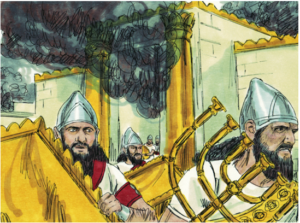
We learn more about God’s justice and the sins of Manasseh during his previous reign.
2 Kings 24:2-4 2 The LORD sent against him (Jehoiakim) bands of Chaldeans, bands of Arameans, bands of Moabites, and bands of Ammonites. So, He sent them against Judah to destroy it, according to the word of the LORD which He had spoken through His servants the prophets. 3 Surely at the command of the LORD it came upon Judah, to remove them from His sight because of the sins of Manasseh, according to all that he had done, 4 and also for the innocent blood which he shed, for he filled Jerusalem with innocent blood; and the LORD would not forgive.
We learned that the Lord heard Manasseh’s penitent prayer, but the consequences of his sins were certainly felt for generations to come.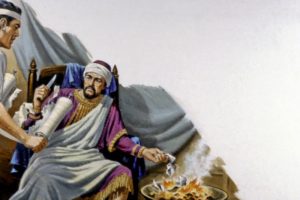
Jehoiachin succeeds his father at Jehoiakim’s death. Babylon’s power has eclipsed that of Egypt under Nebuchadnezzar’s reign. He, like Jehoahaz, only reigns for 3 months before being taken to Babylon as prisoner. Nebuchadnezzar personally came up from Babylon to besiege Jerusalem and demand its surrender. He takes all the treasures and 10,000 people as booty to Babylon. Only the poorest people are left behind. Jehoiachin remains in prison in Babylon for 37 years, before being released when Evil-Merodach becomes king of Babylon.
Jehoiachin’s uncle, Mattaniah, is made King of Judah, and Nebuchadnezzar changes his name to Zedekiah. Zedekiah asks for trouble by doing evil in the eyes of the Lord and rebelling against Nebuchadnezzar. The Babylonians crippled Jerusalem with a four-month siege that starved Jerusalem’s fighting force and caused them to flee with Zedekiah. The Babylonian forces catch up with them, the Jerusalem forces separate from Zedekiah, and Zedekiah is captured. At Babylon, Zedekiah witnesses with his eyes Nebuchadnezzar sentencing his sons to death and killing them before Nebuchadnezzar puts his eyes out.
Nebuzaradan, the commander of the Babylonian guard, sets fire to all the important buildings of Jerusalem. He takes Jerusalem’s chief priests, Seraiah and Zephaniah, as captives to Babylon together with Judah’s leading recruiting officers and advisors, where Nebuchadnezzar executes them.
Jerusalem is devastated. The temple, palace, and city walls are destroyed. The sacred articles of the temple are carried off as is most of the populace. The bronze, the silver and the gold are stripped from the temple and palace furnishings. All valuables are confiscated.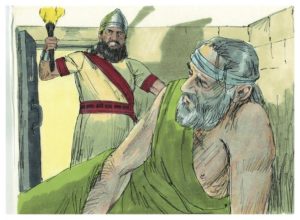
Gedaliah is appointed to govern the people left behind in Judah, but he is soon assassinated. Those with him flee to Egypt for fear of the Babylonians.
After a long imprisonment of 37 years, Jehoiachin is shown favor by the new king of Babylon and given a high seat of honor. So, we come to the final words of the Book of 2 Kings:
2 Kings 25:29-30 29 Jehoiachin changed his prison clothes and had his meals in the king’s presence regularly all the days of his life; 30 and for his allowance, a regular allowance was given him by the king, a portion for each day, all the days of his life.
TODAY’S READING FROM THE NEW TESTAMENT – ACTS 22:17-23:10
Paul continues to give his testimony as he addresses the crowd in Jerusalem, answering their charges that he is against the people of Israel, the law of Moses, and the temple.
Paul is cut off, when in the course of his testimony, he affirms that the Lord Jesus has sent him to preach to the Gentiles. (Acts 22:21).
The crowd begins to riot. The Roman commander unwisely orders Paul to be taken to the barracks and flogged. Before the flogging begins, Paul questions the centurion, “Is it legal for you to flog a Roman citizen who hasn’t even been found guilty?”
Paul serves as his own lawyer, as the fact of Paul’s citizenship and right to a fair trial is paramount. A violation of Paul’s rights as a citizen, even by a Roman officer, would mean prosecution.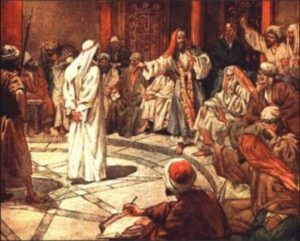
The Roman officer wants to find out the source of the trouble and therefore invites Paul to stand before the Sanhedrin. The tempers of both the priest and Paul begin to flare. The high priest orders that someone strike Paul on the mouth and Paul retaliates with a word that was no stronger than the Lord’s reprimand of the religious hypocrites, calling the priest ‘a whitewashed wall’. Paul humbly apologizes as he respects the high priest’s office, though not his behavior.
Paul knowing that there were both Sadducees and Pharisees on the Sanhedrin, affirms that he is on trial because he is a Pharisee, believing in the Pharisee’s hope- THE RESURRECTION.
This causes a great uproar. The author of the Book of Acts, Dr. Luke explains:
Acts 23:7-8 7 As he said this, there occurred a dissension between the Pharisees and Sadducees, and the assembly was divided. 8 For the Sadducees say that there is no resurrection, nor an angel, nor a spirit, but the Pharisees acknowledge them all.
The atmosphere was so tense and the dispute so violent that the Roman commander ordered that Paul be taken away into the barracks for safety.
TODAY’S READING FROM THE BOOK OF PSALMS- PSALM 2:1-12
Psalm 2 is quoted or alluded to at least 18 times in the New Testament. That makes it the New Testament’s most quoted psalm.
It is a Messianic Psalm, referring to the reign of Christ. It is a “Royal Psalm” referring to the Son of God being established as King. (Psalms 18, 20, 21, 45, 72, 89. 101, 110 and 144 are ‘Royal Psalms’.)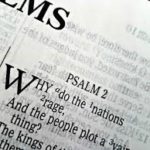
This Psalm and the Davidic covenant speak of a universal and everlasting rule, obviously looking beyond Israel’s earthly kings. This Psalm looks to Jesus, the Eternal Son of God who became man, who was born under the law to fulfill the law on our behalf. He came to die and rise as our Substitute and provide the reconciliation and regeneration necessary to establish the rule of God in our hearts.
We read of the raging voices of the rebellious nations (Psalm 2:1-3); the mocking laughter of the Father in heaven (2:4-6) the voice of the Son of God (2:7-9) and the voice of the Holy Spirit (2:10-12) giving the hearer an opportunity to respond and put their trust in Christ.
TODAY’S READING FROM THE BOOK OF PROVERBS- PROVERBS 18:13
Proverbs 18:13 13 He who gives an answer before he hears, it is folly and shame to him.
Listening is an art for the heart. Be swift to hear. Seek first to understand before seeking to be understood.
LISTEN CAREFULLY. THINK BEFORE YOU SPEAK.
PRAY FOR THE NATIONS -Uttar Pradesh, India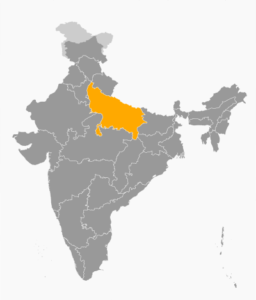
Uttar Pradesh is the home of Hinduism, and it has a long historical connection to Buddhism and Jainism- but it has given no home to the gospel. Millions of Hindu pilgrims visit Varanasi, the holy city of Hinduism on the Ganges River, but few find the Living Water that only Jesus can give. Pray that there might be a major mobilization of prayer for this key state and that God may send the workers who will turn the tide for the gospel.
The scale of human suffering is immense. Cities are crowded and polluted. Rural areas have no amenities, little infrastructure or power, and a severe shortage of health care facilities. Water-borne diseases are widespread. Most of the world’s polio cases occur in Uttar Pradesh. The majority of children are undernourished. In the political arena, poor governance, corruption, and short-term mentalities combine to stunt progress. Pray that the gospel might be made manifest in easing suffering and righting wrongs.
The Christian church is still a tiny minority of officially only 0.1% of the population. Most come from the Chamar and Dom groups- both are Dalits. The widespread presence of persecution, intimidation and ‘reconversion’ campaigns spreads fear and limits growth- and betrays the oppressive beliefs of the perpetrators.
PRAYER: Gracious God and Eternal King! You are worthy and we rejoice that You are enthroned both in the heavens and in our hearts as Lord of all! We have seen the failure of human kings and mourn the failure of our own fickle hearts. We thank You for the Son of God who came to purchase and cleanse us with His atoning blood and wash us from our sins and grant us new life in the Holy Spirit. We ask that You reign in us. We ask that You have mercy on the USA on this, its birthday, and that we would recover our values that emanate from Your Word. Bring a spiritual awakening. We pray this also for the Indian State of Uttar Pradesh. Send forth Your light and Your Truth. Send forth laborers and strengthen the church in the power of the Holy Spirit, that Your Word would take root, birth faith, and bring souls from darkness to light! In Jesus’ Name.
Pastor David
